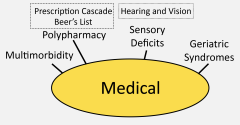Geriatrics
Clinical Skills | Medicial
Medical Domain

Our patients' medical problems make up a large domain in our assessment.
- Among Medicare patients, more than two-thirds have two or more chronic medical conditions.
- Among the 85+ year old group, about 25% have more than 6 chronic medical conditions.
- Geriatricians often focus on how these chronic conditions impact patients' other major domains, including Cognitive (i.e. do their medications worsen or slow thinking?), functional (i.e. do their diseases or medications increase risk of falling?), psychosocial (i.e. does the patient need more caregiver support?), and more.
- Multimorbidity: Multimorbidity is defined as the co-occurrence of two or more chronic conditions such as diabetes, heart failure, hypertension or dementia. These medical conditions are more common in those of older age and can affect one another and influence a patient’s care plan.
- Polypharmacy: The concurrent use of multiple medications.
- Prescription Cascade: This is the concept where prescribed medications are used to treat the side effect or adverse reaction associated with another medication.
- Beers List: The Beers list is the most widely used list of drugs used to assess inappropriate drug prescriptions. The list is divided into 3 categories:
- Medications that should be avoided
- Medications that are potentially inappropriate
- Medications that should be used with caution
- View Beers List
- Choosing Wisely: Visit Choosingly Wisely website
- Supplements: Supplements are any over the counter product
- Many supplements interact with drug metabolism and bioavailability. Thus, it is important to ask about their usage
- Communications Barriers:
- Vision: Cataracts, macular degeneration, and others disorders and age-related changes may cause vision impairment. This has implications on seeing their pills or discharge instructions.
- Hearing: Elderly patients tend to lose the ability to hear higher frequency sounds:
- Speak in a lower toned voice to make it easier to hear
- Pocket talkers are much more affordable alternative to hearing aids
- Slower response time: Speaking or moving quickly leads to medical mistakes and/or inadvertent injury or consequences. Remember to slow down.
- Speak in a lower toned voice to make it easier to hear
- Pocket talkers are much more affordable alternative to hearing aids
- Geriatric Syndromes: These syndromes are a constellation of factors and conditions typical of aging that interplay and ultimately can result in complications and affect morbidity and mortality. Examples of geriatric syndromes include falls, incontinence, weight loss, osteoporosis, dementia, delirium, and frailty.